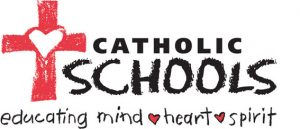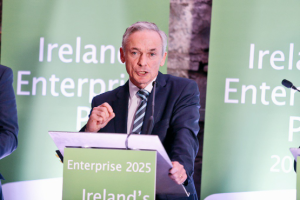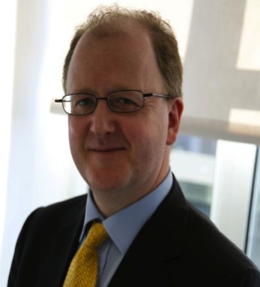
By Sarah Mac Donald - 17 January, 2017

The Catholic Primary Schools Management Association (CPSMA), which represents all the boards of management of the over 2,900 Catholic primary schools in the Republic of Ireland, has “broadly” welcomed the Minister for Education’s announcement of a public consultation process on school admission policies.
In a statement, Seamus Mulconry, General Secretary of CPSMA, said the issue “only occurs in the small number of schools who are oversubscribed”.
He stressed that “The vast majority of Catholic schools are not oversubscribed and enrol all applicants. The issue mainly arises in areas of Dublin and in small pockets of the commuter belt surrounding the capital.”
The CPSMA General Secretary also highlighted that issues arising from any overhaul may “impact in adverse ways on minority groups” and he called for these to be taken properly into account.
The Minister for Education, Richard Bruton, set out four proposals on how to change school admissions in his address on Monday to a seminar organised by Equate Ireland.
These he hopes will address the criticisms of the so-called ‘baptism barrier’ which prioritises children of faith backgrounds in denominational schools.
The Minister said parents are recognised by the Constitution as the primary educators of their children.
“I believe that a desire on behalf of religious parents to educate their children in their faith is welcome and should be respected. This principle is reflected in the Programme for Government. Equally, however, I believe that non-religious parents or parents of minority religions should not be unfairly disadvantaged in seeking to admit their children to their local publicly-funded school.”

Minister Richard Bruton
He said the patronage and ethos of Irish schools was not something which this generation of politicians, public servants, school managers or teachers had created.
“It is something we have inherited, and reflects a very different era in Ireland, and change is needed to meet the needs of today’s families.”
In Ireland 96% of primary schools are under the patronage of Christian religious organisations.
But Minister Bruton said it was important to acknowledge that these organisations began founding schools almost two centuries ago, at a time when few others were volunteering to do so, and provided a system of national education.
While 90% are of Catholic ethos, over a third of couples who are getting married are choosing to do so in a non-religious ceremony, and all the evidence points to a population in which very significantly fewer than 90% of young families are religious, the Minister suggested.
He highlighted a number of steps which need to be taken. These include expanding the range of choice of schools available; ensuring fair access to local schools; improving how we accommodate children who are not part of the denominational ethos of the school they attend; facilitating parents who want tuition in their own faith where possible; and ensuring that regardless of the specific denomination of the school, a context is provided for respect for all faiths and none.
Richard Bruton also told Monday’s seminar that more multi-denominational and non-denominational schools must be developed. The Programme for Government sets a target of delivering 400 such schools by 2030.
“We must also do more to support children who are in religious primary schools but whose parents do not wish them to take part in religious education classes, in accordance with their constitutional rights,” he stressed.
On the issue of admissions, the Minister said the complex and challenging issues surrounding the role of religion in admissions to schools must be addressed.
“I believe it is unfair that, under the current system, a non-religious child can be refused entry to the local school, because preference is given to a religious child living some distance away.”
He continued, “I believe it is unfair that, under the current system, many parents who might not otherwise do so feel pressure to baptise their children because they feel it gives them more chance of getting into their local school. I believe we must address these unfairnesses.”
The first of the four options he outlined was the catchment area approach, which would permit a school to give preference to children of its own religion from within the catchment area. However, it would prohibit religious schools from giving preference to children of their own religion who live outside the catchment area ahead of non-religious children who live inside the catchment area.
The second option is the ‘nearest school rule’ in which a school could only give preference to a child of its own religion where that it is the nearest school of that religion for that child.
The quota option would allow a religious school to give preference to children of its own religion in respect of a specified percentage of its places.
The last and most radical option is a simple prohibition, which would prohibit all publicly funded schools from giving any preference to children based on religion, with no limitations for geography or anything else.
The Catholic Schools Partnership (CSP) welcomed the Minister’s announcement of a consultation process on the role of a religion as a selection criterion for admission to primary schools.
In a statement, the CSP said it would carefully look at the four possible approaches suggested by Minister Bruton, and the group stressed that changes in education policy must be carefully thought through and based on sound empirical evidence.
The umbrella organisation also highlighted that baptism is not a criterion for entry into a Catholic primary school which is not oversubscribed.

Seamus Mulconry, CPSMA
Seamus Mulconry (CPSMA) underlined that the issue was being “misleadingly” referred to as the ‘baptism bar’.
“It is important to clarify that there is no requirement for parents to have their children baptised in order to gain admission to a Catholic school,” he said.
Mr Mulconry also warned that “Reforms to admissions policies will do nothing to alleviate the shortage of school places: only extra school places can achieve that.”
The Iona Institute described the Minister’s comments and proposals as the “latest in a series of moves against faith schools” and said this pattern of moves “amounts to an attitude of hostility”.
In his statement, Iona Institute Director, David Quinn, said, “There are certainly too many Catholics schools in Ireland and this must change because Ireland is changing. The right of Catholic and other faith schools to automatically prefer children of their own faith over children of other faiths and none, in the event of over-subscription, is something that can be amended.
“However, the speech by Minister Bruton, in which he flags this proposal, is only the latest in a series of moves by this Government and the last which are seeking to severely limit the rights of faith schools”.
David Quinn highlighted how “Under the last Government, the employment rights of faith schools were weakened, and the Forum on Patronage and Pluralism, established by Ruairi Quinn, went so far as to recommend that faith schools could not give special prominence to the religious symbols of their own faiths on school property, that prayers be made more ‘inclusive’, and that the teaching of religion be restricted to the start or end of the school day.
“Minister Jan O’Sullivan under the last Government abolished Rule 68 of the Rules for National Schools which helps protect the right of faith schools to permeate the day with the religious ethos of the school, and more recently there is a proposal to force faith schools to teach a course called ‘Education about Religion, Beliefs and Ethics’.”
Mr Quinn concluded, “Now we have this new proposal with regard to admissions policy outlined by Minister Bruton this morning. There is no doubt that more provision must be made for parents who do not wish to send their children to a denominational school, but when you put together all that this Government and the last Government have done, or propose to do, it indicates a large degree of hostility to faith schools that the various faith communities ought to note. They should also take action to protect their rights.”